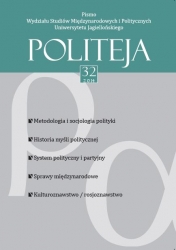Trwoga 10/04 w świetle badań opinii publicznej
The Fear of 10.04 in the Light of Opinion Polls
Author(s): Paweł ŚcigajSubject(s): Politics / Political Sciences
Published by: KSIĘGARNIA AKADEMICKA Sp. z o.o.
Keywords: Smolensk Crash; terror management theory; public opinion; political attitudues
Summary/Abstract: April 10th 2010 is undoubtedly one of the most important dates in modern Polish political history. 96 high Polish officials, including President Lech Kaczynski, died in an airplane crash in Smolensk. It can be assumed that this tragedy had a great impact on political attitudes. Unfortunately, very few authors in Poland conducted empirical research on this topic. The paper addressed the issue of probable psychological consequences of Smolensk Crash on political attitudes in the light of terror management theory. On this ground it can be said that arousing of mortality awareness after April 10th should result in a widespread feeling of terror. In other words, “threat of annihilation” should occur as a consequence of recalling those who died in Smolensk in the media. One of the major mechanisms to manage such anxiety is construction and maintenance of cultural worldviews, like ideologies. It leads to the hypothesis that when threatened, people are more likely to think and act in accordance with the cultural worldviews they share. Political leaders can be seen as guards of these cultural worldviews and if it is so, then trust and support for the politicians should increase when mortality salience occurs. Some of the public opinion research conducted in the first days after Smolensk crash are used to illustrate this hypothesis.
Journal: Politeja - Pismo Wydziału Studiów Międzynarodowych i Politycznych Uniwersytetu Jagiellońskiego
- Issue Year: 11/2014
- Issue No: 32
- Page Range: 63-91
- Page Count: 29

